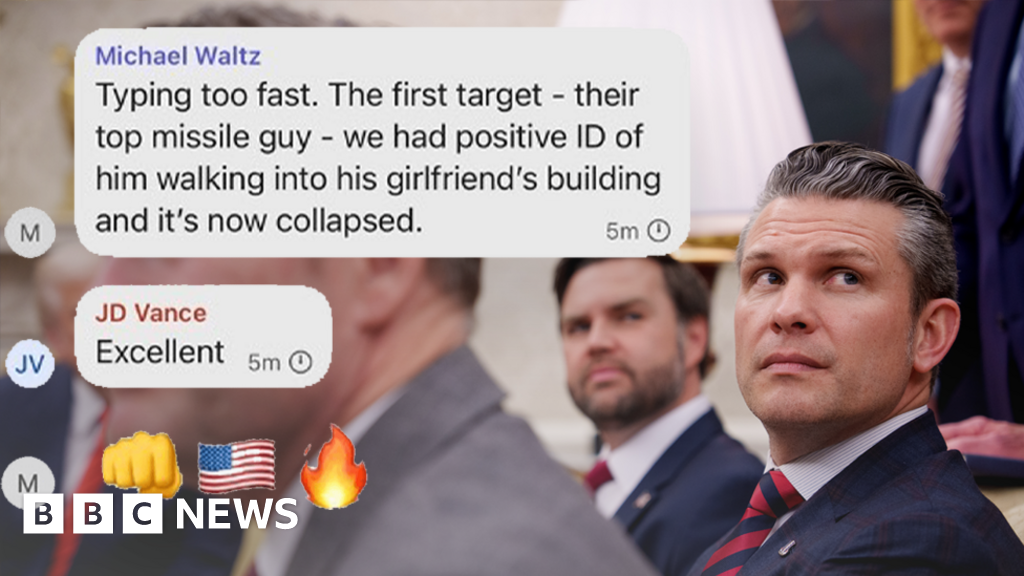BBC News, White House
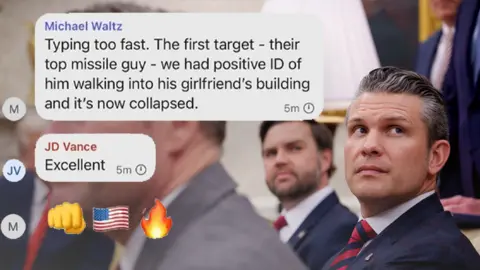 Gety pictures
Gety picturesA high -ranking US security officials have been published on a US air strike on the entire Yemen by Atlantic.
The collective chat included on the error -editor -in -chief of ATLANTIC JEFREY GOLDBERG.
After curbing some chat excerpts in a previous piece, he decided on Wednesday To publish the entire stock exchange After senior officials insisted that there was no secret information in the group.
Mr. Goldberg wrote that these phrases “led us to believe that people should see texts in order to reach their own conclusions.”
Messages, however, you need some not to act. Here are three of them with some analyzes.
The timeline of the attack
These messages provide details of the “package” of the US military strike for Yemen’s strikes – a military term indicating a group of aircraft, arms systems and intelligence collection devices that will participate in the operation.
“The idea is that this was not classified information at that time an unimaginable thing,” Glenn Gistel, the former General Adviser to the National Security Agency (NSA), told BBC.
He added that the secrecy may have been raised after that, but any imminent military action that included American forces could have been classified at that time.
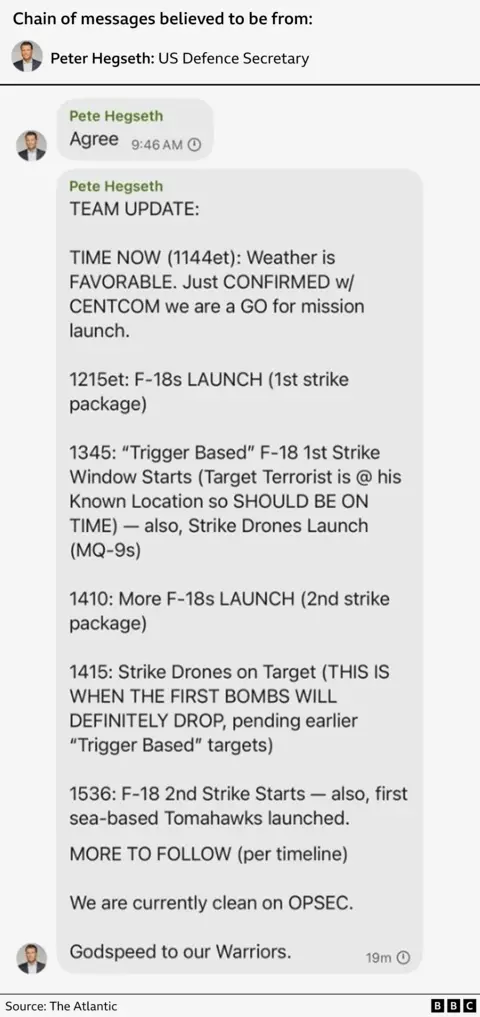
The messages from HegSeth notice what is the time when the F-18 Fighter Fighter is launched, as well as when the strikes occur and in any time frame “the” trigger-based “attacks can occur.
In this context, the “trigger” refers to a group of teachers that must be recognized before the deployment of weapons. It can be a visual reference point, like a mobile phone lights up.
This information is very sensitive.
Philip Ingram, a former military intelligence officer in the British army, told the BBC that similar information “is firmly in the arch what could have been classified on the secret.”
“In practice, you can give up where the plane will come,” he added.
In the wake of the chat detection, the White House and other US officials argued that this information does not constitute a “war plan”.
In a post on X, Higseth said: “The Atlantic Ocean has released what is called” war plans “and those” plans “include: no names. No goals. There are no sites. There are no units. No ways. There are no sources. There are no ways.”
The effects of the attack
In this part of the group chat, National Security Adviser Mike Waltz offers an update on the strike – which is called in the military language to assess the damage of the battle, or BDA.
Waltz notes that the target building had collapsed, and that the US military had earlier had a positive definition of the target – the “Houthi” “struggle” – walking in the building, which was believed to be the headquarters of his girlfriend.
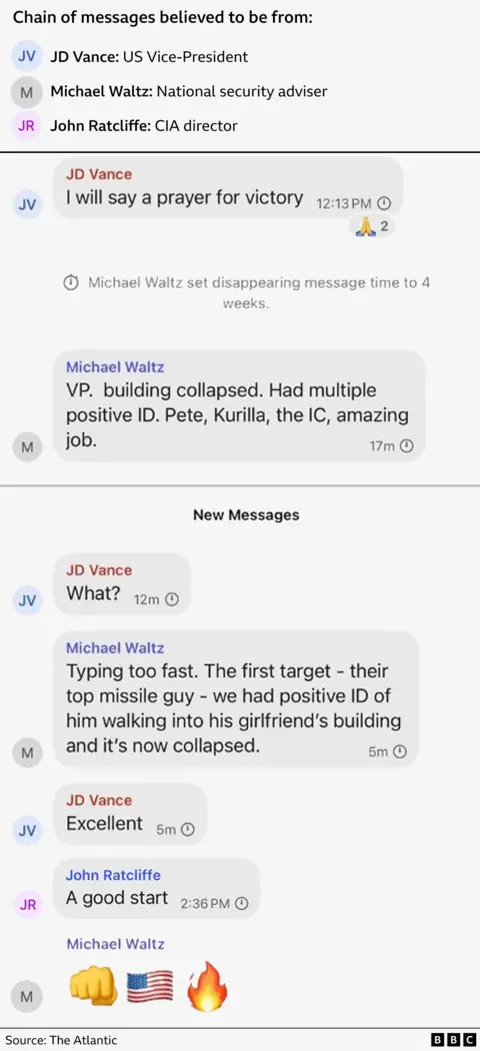
In his letter, Waltz Pete – referring to HegSeth, in addition to IC, congratulates the “intelligence community” and Kurilla, referring to Michael Corella, a US military general who supervises the central leadership, which is a regional fighter with responsibility for the Middle East and parts of Central and South Asia.
The messages do not reveal how to track the location of the target or movements.
A military expert contacted by the British Broadcasting Corporation – but he wants to rename Nameless – suggested that a mixture of weather platforms, technological tracking capabilities or human intelligence can be used on the ground, or a mixture of different sources.
At least 53 people were killed in the initial wave of American air strikes on the Houthi targets in Yemen, which hit more than 30 goals, including training facilities, and drone infrastructure, as well as manufacturing weapons and driving and control centers, including one in which the Pentagon said that many unmanned air vehicle experts.
It is not clear which of the goals that Waltz was referring to in the group chat.
Central Intelligence Agency activities in Yemen
Another potentially sensitive message comes from Joe Kent, a former operational soldier and candidate of Congress that was exploited by Trump to be the director of the National Center for Combating Terrorism.
In his message, Kent says that Israel may carry out its own strikes after the American operation.
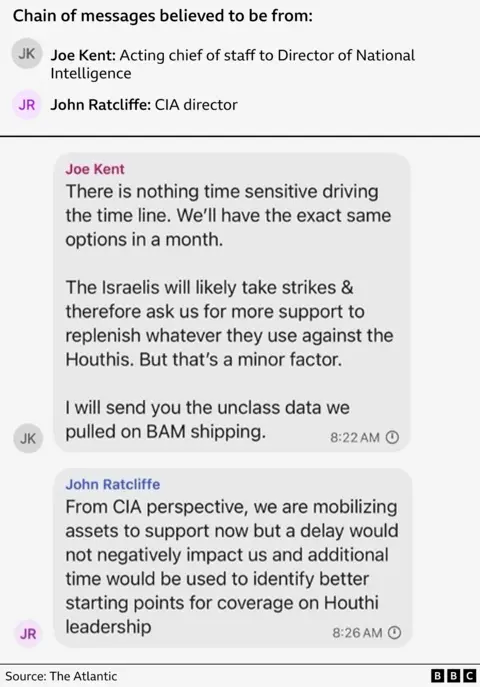
The Israeli army has repeatedly hit Houthi targets in Yemen since the beginning of the war in Gaza, in response to missile attacks and drone attacks on Israeli targets to support Hamas.
The latest attacks took place on December 19 and 26 last year.
According to Kent, the Israeli government will seek to “renew” any arms shares used in more raids, although it is believed to be a “simple factor.”
It follows a slightly sensitive message from the Director of the CIA John Ratcliffe, who notes that the United States “worshiping assets” to help a strike, but the delay “will not negatively affect” the agency’s work in Yemen.
“An additional time will be used to determine better starting points to cover up Houthi leadership,” Books.
In this context, the assets can refer to spies run by the CIA on the ground in Yemen, or technological means such as drone monitoring trips.
Mick Mulri, former Deputy Assistant Secretary of Defense and a former semi -military officer in CIA, said Ratcliffe’s message was very sensitive.
“Basically, we do not want to share the place where the CIA.”
Ratcliffe told at home on Wednesday that he had not conveyed secret information.
(With additional reports from Nomia IQBAL and Ruth Comerford)
